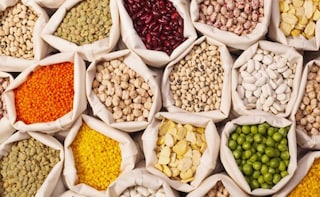Legume, an ingredient that is commonly used in the Indian kitchen, refers to a category of foods that include lentils, chickpeas, beans and peas. In simpler words - dal, rajma, chana, chole, etc. For centuries we have been including them in our daily diet, dishing out delicious dishes like dal tadka, dal makhani, moong dal halwa, pokaras, vadas, you name it! Legumes are a great source of vegetarian proteins, and they come loaded with several health benefits. According to a new research, higher consumption of legumes has the potential to lower the risk of developing Type 2 diabetes by 35 per cent.Legumes are a food group rich in B vitamins, and contain different beneficial minerals like calcium, potassium and magnesium. The findings showed that among the different subtypes of legume, participants who had a higher consumption of lentils - one serving per week - had a 33 per cent lower risk of developing the disease.
Advertisement
For the latest food news, health tips and recipes, like us on Facebook or follow us on Twitter and YouTube.
Advertisement
